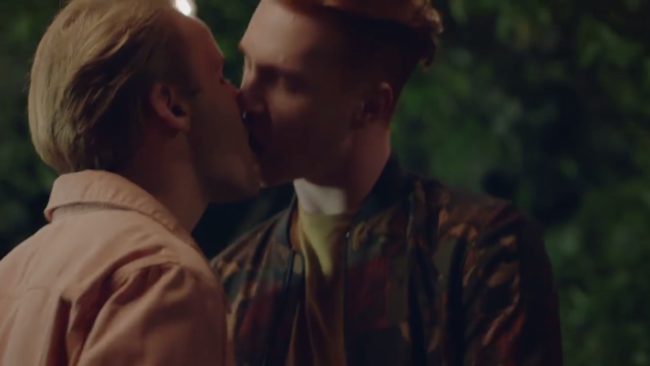Gay-themed TV adverts dominate ‘most complaints’ list

Gay-themed adverts dominate the list of those that attracted the most complaints last year.
The UK’s Advertising Standards Authority released a list of the 10 adverts which received the most complaints from the public.
Three ads with LGBT themes made the top 10 this year.
Clocking in at number eight, with 125 complaints is an ad from mobile phone brand O2, which featured two men kissing – and one of them breaking their phone’s screen as they are pressed into a table.

The ASA said: “Many felt the scene was too sexually explicit and scheduled inappropriately at times when children were likely to be watching. Some also felt the portrayal of a same-sex relationship was offensive to their religious beliefs.
“We noted that the scene in question was brief and did not contain any graphic or overly sexual imagery. We ruled that it did not require a scheduling restriction and the depiction of a gay couple would not cause serious or widespread offence.”
Meanwhile an ad for Match.com featuring a number of couples passionately kissing attracted 293 complaints over the inclusion of a lesbian couple – enough to place it fourth on the list.

The ASA said: “We received similar complaints [in 2016], when it was number three on our list, about whether the ad was too sexually explicit for children to see.
“We ruled then that the ad did not cross the line. Over the two years, the ad has attracted almost 1,200 complaints.”
Meanwhile, a long-running and much-maligned ad campaign for Moneysupermarket, which features men dancing in high heels. racked up a massive 455 complaints last year – putting it in second place behind an ad for KFC.
ASA Chief Executive Guy Parker said: “Tackling misleading ads continues to be the bread and butter of our work, but 2017 again showed that it is ads that have the potential to offend that attract the highest numbers of complaints. But multiple complaints don’t necessarily mean that an ad has fallen on the wrong side of the line: we look carefully at the audience, the context and prevailing societal standards informed by public research before we decide.”
Advertising lawyer Geraint Lloyd-Taylor of law firm Lewis Silkin, a member of LGBT advertising industry group PrideAM, told PinkNews: “It is frustrating that the Top 10 list still includes complaints about same sex couples sharing an innocuous kiss.
“It’s now 2018, and if it’s OK to show a straight couple doing something in an ad, then it’s equally ok to show a same sex couple doing the same thing. It’s that simple.
“The Match.com ad features a female couple. It’s the second year in a row it has made the list after appearing in the top three most complained about ads of 2016 too. It has amassed almost 1,200 complaints over two years. It begs the question, what tiny fraction of that number would have felt compelled to complain if the ad had featured a man and a woman?
“The O2 ad is a new entry. 125 people complained about a pretty fleeting kiss. Apparently, many viewers felt it was too sexually explicit, and scheduled inappropriately so was likely to be seen by children. You can probably guess how much sympathy I have for that argument.”
Mr Lloyd-Taylor said: “There will always be some people who find the depiction of a kiss between a same sex couple so deeply offensive that they feel compelled to complain about it.
“We live in a diverse society, and people hold diverse views and opinions as they are entitled to, but, thankfully, society is moving on. Perhaps some people feel it is moving on a little too quickly for them and they feel left behind, but hopefully, they will come to realise quite quickly that they have absolutely nothing to feel worried about.
“The good news is that the ASA has taken a consistent position on the depiction of same sex couples in advertising, which has been to listen to people’s complaints but not to uphold them. That’s the right approach in my view.
“There will likely always be some people with homophobic, sexist, racist, or xenophobic views in society but those people should not define society. Brands and agencies should not shy away from standing up for what’s right, they should keep promoting diversity and inclusion in 2018.”

